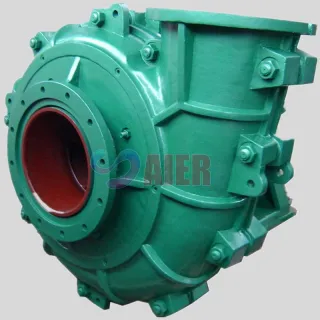ഡിസം . 22, 2024 05:58 Back to list
high quality impeller for slurry pump manufacturers
High-Quality Impellers for Slurry Pump Manufacturers
In the world of industrial pumping, slurry pumps play a crucial role in the transportation of abrasive and viscous materials, making their components essential for efficient operation. Among these components, the impeller is one of the most critical parts, directly influencing the pump's performance, longevity, and the fluid's handling capabilities. This article discusses the importance of high-quality impellers for slurry pump manufacturers, exploring their design, materials, and impact on operational efficiency.
The Role of Impellers in Slurry Pumps
An impeller is a rotating component of a pump that imparts kinetic energy to the fluid flowing through the pump, generating pressure to move the slurry. In the case of slurry pumps, which are specifically designed to handle mixtures of solids and liquids, the impeller must be robust enough to withstand abrasion and corrosion caused by the solid particles within the slurry.
The design of the impeller is crucial. It must effectively create a flow pattern that minimizes turbulence while maximizing energy transfer. A well-designed impeller will not only facilitate smoother flow but will also enhance the overall efficiency of the pump, reducing energy consumption and operational costs.
Importance of Material Selection
The materials used in manufacturing impellers for slurry pumps are vital for their performance and durability. High-quality impellers are typically made from wear-resistant materials, such as high chromium alloys or rubber-lined metals, which can withstand harsh conditions and extend service life. The choice of material directly affects the impeller's resistance to erosion and corrosion.
For instance, high-chromium cast iron is a popular choice for its excellent wear resistance properties, making it ideal for handling abrasive slurries. On the other hand, rubber-lined impellers offer flexibility and chemical resistance, making them suitable for corrosive applications. The selection must be tailored to the specific type of slurry and the operational environment to ensure optimal performance.
high quality impeller for slurry pump manufacturers

Design Innovations
With advancements in technology, the design of slurry pump impellers has also evolved. Manufacturers are now employing computer-aided design (CAD) and computational fluid dynamics (CFD) to optimize impeller shapes for maximum efficiency and performance. These tools allow engineers to simulate fluid flow around the impeller, enabling them to fine-tune designs and predict performance outcomes before physical prototypes are made.
Innovative designs often include features such as adjustable vanes, which provide the ability to fine-tune the pump's performance according to varying operating conditions. Additionally, impellers with a more open construction can enhance the handling of larger solids within the slurry, reducing the risk of blockages and ensuring consistent flow.
Impact on Operational Efficiency
The quality and efficiency of an impeller directly impact the overall operation of slurry pumps. High-quality impellers significantly reduce wear and tear on the pump, thereby extending maintenance intervals and reducing downtime. Consequently, this results in higher productivity and lower operational costs for businesses relying on slurry pumps for their processes.
Moreover, efficient impellers contribute to lower energy consumption, which is a critical consideration in today's environmentally conscious world. By reducing the energy required to operate the pump, businesses can not only save on costs but also minimize their carbon footprint.
Conclusion
In summary, high-quality impellers are integral to the functionality and efficiency of slurry pumps. Their design, material selection, and innovative manufacturing processes play a significant role in maximizing the performance of these critical industrial tools. As the demand for efficient and sustainable pumping solutions continues to rise, slurry pump manufacturers must prioritize the production of high-quality impellers to meet the evolving needs of industries involved in handling abrasive and viscous materials. By investing in superior impeller technology, manufacturers can ensure the reliability, efficiency, and longevity of their slurry pumps, ultimately leading to increased customer satisfaction and competitiveness in the market.
-
Top Submersible Pump Companies High Quality Manufacturers & Suppliers in China
NewsJul.08,2025
-
High Quality Seal for 5 Inch Dredge Pump Reliable China Manufacturer & Supplier
NewsJul.08,2025
-
High-Efficiency Slurry Sand Pump from Leading China Manufacturer – Durable & Reliable Solutions
NewsJul.07,2025
-
High-Quality Slurry Pump Made in China Durable Steel Mill Slurry Pump & Parts
NewsJul.07,2025
-
High Quality Excavator Dredge Pump Manufacturer & Suppliers from China – Reliable, Durable, Efficient Solutions
NewsJul.07,2025
-
Wholesale Slurry Pump Closed Impeller Supplier High Efficiency China Slurry Pump Closed Impeller
NewsJul.06,2025
